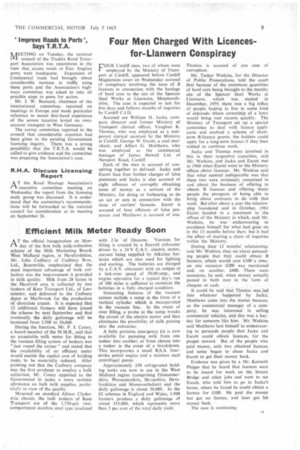Four Men Charged With Licencesfor-Lianwern Conspiracy F OUR Cardiff men. two
Page 11

If you've noticed an error in this article please click here to report it so we can fix it.
of whom were employed by the Ministry of Transport at Cardiff, appeared before Cardiff Magistrates court on Wednesday accused of conspiracy involving the issue of B licences in connection with the haulage of hard core to the site of the Spencer Steel Works at Llanwern, Monmouthshire. The case is expected to last for rive days and follows months of inquiries by Cardiff C.I.D.
Accused are William H. Jacka, company director and former Ministry of Transport clerical officer. Vaughan K. Thomas, who was employed as a temporary clerical assistant by the Ministry at Cardiff, George W. Escott, a coal merchant, and Albert G. Matthews, who was employed as the commercial manager of James Howell Ltd. of Newport Road, Cardiff.
Each of the men is accused of conspiring together to defraud. Jacka and Escott face four further charges of false pretences and Jacka is also accused of eight offences of corruptly obtaining sums of money as a servant of the Ministry, for doing or forbearing to do an act or acts in connection with the issue of carriers' licences. Escott is accused of four offences of false pretences and Matthews is accused of one. Thomas is accused of one case of corruption.
Mr. Tasker Watkins, for the Director of Public Prosecutions, told the court that because of the enormous quantities of hard core being brought to the marshy site of the Spencer Steel Works at Llanwern, which was started in December, 1959, there was a big influx of • people hoping to live in some kind of eldorado where ownership of a lorry would bring vast returns quickly. The Ministry of Transport set up a special committee to deal with licence applicants and evolved a scheme of shortterm B-licence grants; the holders could apply for a long-term licence if they then wished to continue work.
Jacka and Thomas were involved in this in their respective capacities, said Mr. Watkins, and Jacka and Escott met in 1960 when Escott went to the Ministry offices about licences. Mr. Watkins said that what seemed indisputable was that these two were intimately concerned in and about the business of offering to obtain B licences and offering many people the prospects of being able to bring about contracts to do with that work. But after about a year the relationship foundered and in October, 1961 Escott handed in a statement to the offices of the Ministry in which. said Mr. Watkins. he was endeavouring to exculpate himself for what had gone on in the 12 months before then; but it had the effect of starting a chain of inquiries within the Ministry.
During their 12 months' relationship, said Mr. Watkins. they set about persuading people that they could obtain B licences, which would cost 1:100 a time: on one occasion .£200 was mentioned and, on another. f600. There were occasions, he said, when money actually passed to both men in the form Of cheques or cash.
It could be said that Thomas was led into whatever happened by Jacka; Matthews came into the matter because, as the commercial manager of a company, he was interested in selling commercial vehicles, and this was a heyday for someone like him. Mr. Watkins said Matthews lent himself to endeavouring to persuade people that Jacka and Ewalt could obtain licences, for the proper reward. But of the .people who paid money, only two obtained licences and some began to chase Jacka and Escott to get their money back.
Evidence was given by a Mr. Kenneth Phipps that he heard that licences were to be issued for work on the Severn Bridge and other jobs and went to see Escott, who told him to go to Jacka's house, where he found he could obtain a licence for £100. He paid the money but got no licence, and later got his money back.
The ease is continuing.












































































































